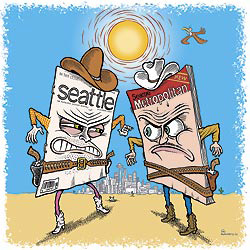- Dar Williams, “Alleluia” (Razor & Tie; 1993).
- Modest Mouse, “3rd Planet” (Epic; 2000).
- Tori Amos, “God” (Atlantic; 1994).
- Randy Newman, “God’s Song (That’s Why I Love Mankind)” (Nonesuch; 2003).
- The Dandy Warhols, “Hard on for Jesus” (Capitol; 1997).
- Modest Mouse, “Bukowski” (Epic; 2004).
- Elliott Smith, “Last Call” (Cavity Search; 1994).
- Cake, “Comfort Eagle” (Columbia; 2001).
- Ben Folds, “Not the Same” (Epic; 2001).
- Rufus Wainwright, “Gay Messiah” (Geffen; 2004).
I don’t recall exactly when I stopped believing in God, but I suspect it wasn’t long after I got to the bottom of that whole Santa Claus thing. For many devout secularists like me, music functions as a surrogate religion: something to get caught up in, even become ecstatic about, without feeling like the victim of a sinister brainwashing machine. Yet despite my avowed atheism, I’m drawn to secular artists who write songs about religion—in particular, songs that tug at God’s long, white beard with equal parts affection and irreverence.
On her debut album, singer-songwriter Dar Williams uses her girlish voice and a bouncy folk-rock melody to tell the story of a self-styled bad girl who steals a car, wrecks it, and ends up in a kingdom of heaven that’s more like an extremely tacky summer camp, complete with “donkey rides and singing ’round the fire.” Yet the afterlife also bears a discomfiting resemblance to high school: “God looks like a guidance counselor/God’s got that smile.” Regarding earthbound humans’ relationship with God, Modest Mouse singer Isaac Brock and piano man Randy Newman agree on a premise (“What fools these mortals be,” basically) but take different approaches. In four airtight lines, Brock diagnoses religion as a paranoid delusion (“The 3rd Planet is sure that they’re being watched/By an eye in the sky that can’t be stopped/When you get to the promised land/You’re gonna shake that eye’s hand”); returning to his tussle with the Lord an album later, he snarls, “If God takes life, he’s an Indian giver.” Yet Newman’s claim—that Our Heavenly Father is a cackling sadist who gets off on our misguided need for him—is even darker.
Skepticism is the simplest form of blasphemy, since religion usually demands unquestioning faith. Elliott Smith kept coming back to nihilistic themes in his music, and “Last Call” is a prime early example. Hung over, he hears church bells and stumbles out of bed (“I guess it must be some kind of holiday”), then groggily concedes, “I’ll sing the praises of my maker’s name/Like I was as good as she made me.” If Smith implies that prayer is a vain effort (in both senses), Cake’s John McCrea comes right out and says it, likening the founding of a cultish faith to the construction of a multilane highway and offering the faithful “pendant key chains.” Finally, there’s a special class of blasphemers who can only acknowledge the Almighty on their terms. Ben Folds reports on a friend of a friend who finds Jesus via an acid trip—and who among us hasn’t?—while Rufus Wainwright reconfigures the arrival of the Messiah as a bawdy pocket history of ’70s gay iconography. It’s a savage stab at a big religious concept, but Wainwright’s warm voice sheathes it in angelic sweetness.
Neal Schindler is a Seattle Weekly staff writer.








